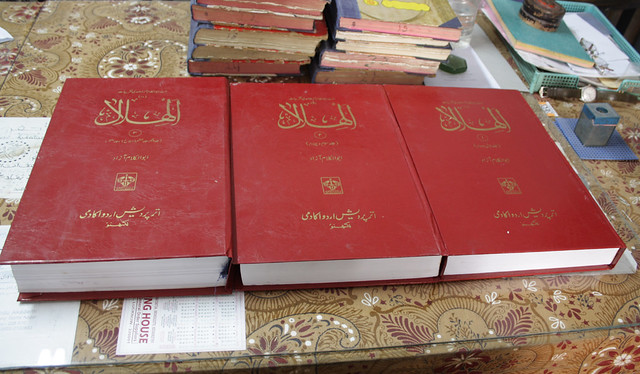By Mohammed Tariq Azim for TwoCircles.net
The National Education Day (November 11) is observed every year to commemorate the birth anniversary of Maulana Abul Kalam Azad, the first education minister of independent India, who served from 15 August 1947 to 2 February 1958. He laid the foundation of two brilliant institutions: the Indian Institute of Technology and the other is University Grant Commission.

From building a nation to bridging these institutes, he participated in all freedom movements and was an unshakable voice of Hindu-Muslim Unity. He established an Urdu weekly newspaper in 1912 called Al-Hilal (The Crescent) to increase the revolutionary recruits amongst the Muslims. Al-Hilal played an important role in forging Hindu-Muslim unity after the blood-bath between the two communities in the aftermath of Morley-Minto reforms.
Later on Al-Hilal was banned in 1914 under Press Act of 1914 by the British government due to onset of World War -1 and they tightened censorship and restrictions on political activity. Maulana Azad then started another weekly called Al-Balagh with the same mission of propagating Indian nationalism and revolutionary ideas based on Hindu-Muslim unity. In 1916, the government banned this paper too and expelled Maulana Abul Kalam Azad from Calcutta and interned him at Ranchi from where he was released after the First World War in 1920. Azad’s publications and speeches (Friday Namaz Sermons in Jama Masjid of Ranchi) were aimed at encouraging young Muslims into fighting for independence and advancing Hindu-Muslim unity. His work helped improve the relations between Hindus and Muslims in Bengal, which had been soured by the controversy surrounding the partition of Bengal (1905) and the issue of separate communal electorate. His autobiography, ‘India wins freedom’ reflects his personal experiences when India became independent, and his ideas of freedom and liberty.
When British government agreed to transfer power to Indian hands in 1946, Azad led the Congress in the elections for the new Constituent Assembly of India, which would draft India’s constitution. He headed the delegation to negotiate with the British Cabinet Mission, while attacking Jinnah’s demand for Pakistan and the Cabinet Mission’s proposal of 16 June 1946 that envisaged the partition of India. However, Jinnah’s Direct Action Day agitation for Pakistan, launched on 16 August sparked communal violence across India. Thousands of people were killed as Azad travelled across Bengal and Bihar to calm the tensions and heal relations between Muslims and Hindus. Despite Azad’s call for Hindu-Muslim unity, Jinnah’s popularity amongst Muslims soared and the League entered a coalition with the Congress in December, but continued to boycott the constituent assembly. Azad continued to proclaim his faith in Hindu-Muslim unity:
“I am proud of being an Indian. I am part of the indivisible unity that is Indian nationality. I am indispensable to this noble edifice and without me this splendid structure is incomplete. I am an essential element, which has gone to build India. I can never surrender this claim,” he said.
Since 2014, National Unity Day (Rashtra Ekta Diwas) is observed on October 31 to commemorate the birth anniversary of Sardar Vallabbhai Patel, the first Home Minister and Deputy Prime Minister of India. He did a commendable job by uniting India into a one nation from approximately 565 self-governing Princely states. The Article 1 of our constitution which encapsulates the definition of India, is credited to Patel, whom we salute him by lauding him as the Iron Man of India. He also participated in all freedom movements and worked closely with Azad, Nehru and Gandhi (1942).
Both Patel and Azad never stood divided on the issue of national interests. National interest was first for them, and they kept their differences aside.
But the current regime is making a clear discrimination between these two brave leaders who fought tooth and nail against the Colonial Power and later helped in building a nation which carries a great vision as enumerated in the Preamble of our constitution. Both have been posthumously awarded India’s highest civilian award, the Bharat Ratna.
Patel’s anniversary was celebrated by the current government with high zeal and respect and it should be celebrated this way. Our Prime Minister has addressed the Nation on this day and nation too has celebrated this great man. The Ministry of Information and Broadcasting has performed its brilliant job by broadcasting and informing the nation about this Iron Man.
But what happened on Azad’s anniversary? The nation did not hear a single word from the Prime Minister except a one-line press release; not a single ministry celebrated this great man who set forth the foundation of education in independent India. The only expectation was, as expected, the Ministry of Minority Affairs, but even that toes the line drawn for them by the saffron brigade.
The discriminatory approach towards Maulana Azad exposes the communal agenda of this government who constantly shed tears for Sab ka Sath, Sab ka Vikas. This dissemination of personality who belongs to a minority community from the history and later bring that same personality in a hostile character is clear agenda of RSS. Tipu Sultan’s character assassination clearly testifies this tactics, in line with the thoughts of MS Golwalkar.
The act of de-politicising or disfiguring the true imagery of a personality of national repute and more so of someone who belongs to the minority community, reinforces the ‘othering’ of the same. This othering of the personalities is obvious in RSS agenda in two ways: by discrediting them for what they have honestly done, and by painting the histories with bigotry and communal hysteria and locating them as agents of the anti-Hindu-nationalist conscience.
The author is a resident of Bangalore

